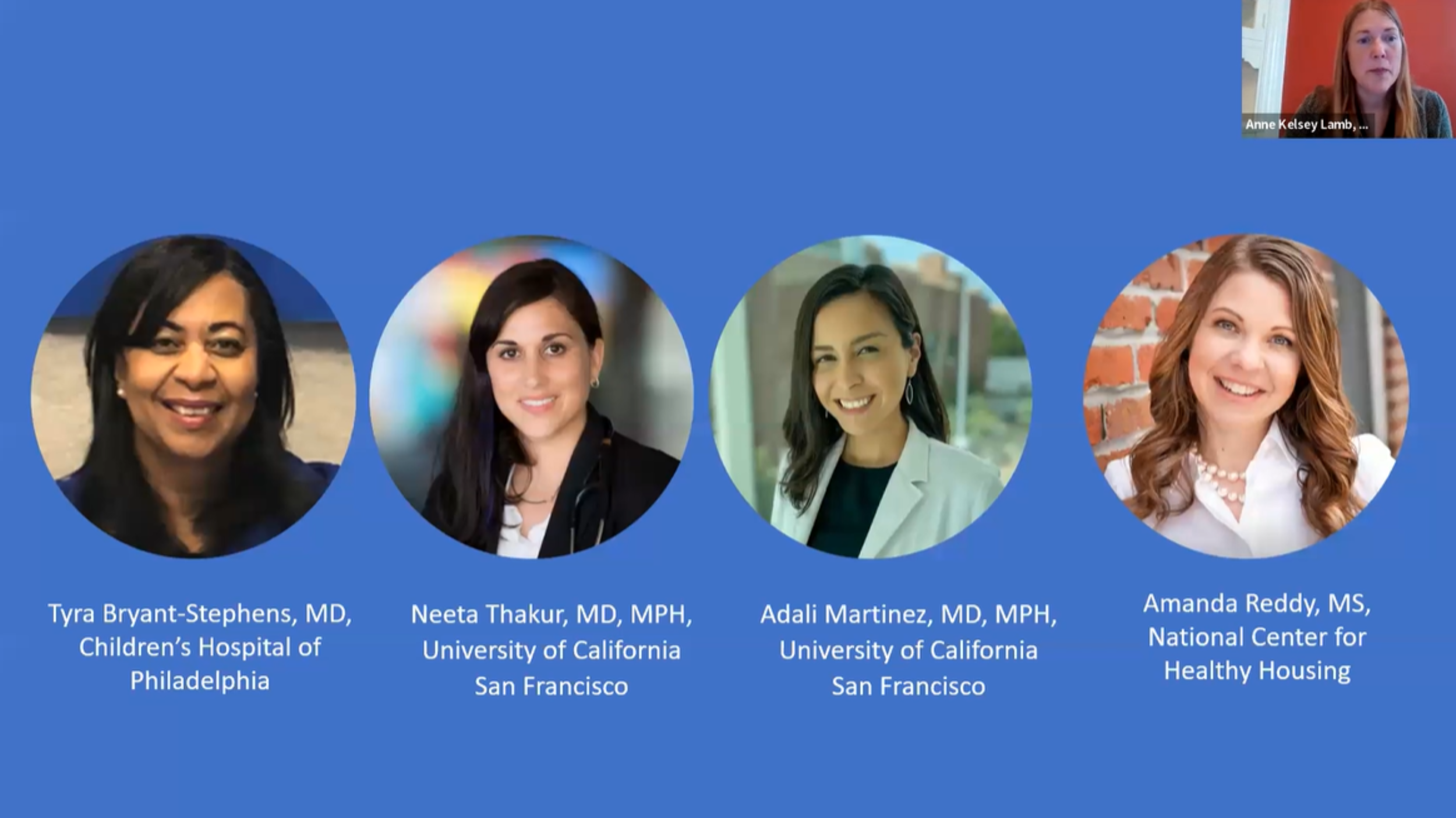
Webinar Recording: Racism, Housing and Asthma
- Anne Kelsey Lamb, MPH
- Tyra Bryant-Stephens, Neeta Thakur, Adali Martinez, Amanda Reddy
-
Focus Areas
Chronic Disease Prevention, Environmental Health -
Issues
Asthma -
Programs
Regional Asthma Management and Prevention Program

In December 2023, PHI’s Regional Asthma Management & Prevention (RAMP) and the National Center for Healthy Housing (NCHH) jointly hosted a conversation on the connections between racism, housing and asthma with three of the country’s leading practitioners and researchers in this space:
- Tyra Bryant-Stephens, MD, Children’s Hospital of Philadelphia
- Neeta Thakur, MD, MPH, University of California San Francisco
- Adali Martinez, MD, MPH, University of California San Francisco
Among those providing asthma home visiting services and/or working toward scaling and sustaining asthma home visiting services, many agree that housing is one of the most critical social determinants of asthma health disparities.
Further, we know that poor housing conditions are not the result of individual behaviors nor happenstance. Rather, poor housing conditions in BIPOC communities are a direct result of historical and current policies and practices imbued with structural racism, including redlining, industrial zoning, exclusionary zoning, discriminatory or predatory lending, and systematic displacement.
With this shared recognition, it’s important to explicitly name and address structural racism. Each of the three conversation participants are doing this through their work and their research. Through this conversation, they challenged and motivated those working across the spectrum of activities to improve asthma outcomes to take action with a long-term vision of racial equity.
Additional Resources
Presenters
- Dr. Tyra Bryant-Stephens is a board-certified pediatrician in clinical primary care practice for over 35 years and Associate Professor of Pediatrics at the Children’s Hospital of Philadelphia. In 1997 she founded the Community Asthma Prevention Program (CAPP) of Children’s Hospital of Philadelphia (CHOP), an asthma program that implements asthma interventions in underserved, under-resourced inner-city communities. When CHOP launched its Center for Health Equity in 2021, Dr. Bryant-Stephens was chosen to lead the Center and now serves as AVP, Chief Health Equity Officer. Dr. Bryant-Stephens is nationally recognized for her work in community-driven, evidence-based research in asthma interventions. She served as a member of the Expert Panel Working Group of the National Heart, Lung and Blood Institute which released the 2020 Focused Updates to the Asthma Management Guidelines. She currently serves on the federal advisory asthma committee, National Asthma Education and Prevention Program Coordinating Committee (NAEPPCC).
- Dr. Neeta Thakur is an Associate Professor and the co-Director of the Partnerships for Research in Implementation Science for Equity (PRISE) Center at the University of California, San Francisco (UCSF). Over the past decade, Dr. Thakur has developed a novel research agenda that is directed towards 1) defining obstructive lung disease phenotypes that exist in racially and ethnically diverse communities and how these are shaped by social and environmental stressors, 2) identifying community-specific drivers that place individuals at high risk for poor outcomes, and 3) co-developing place-based and targeted interventions aimed at social and environmental stressors to improve respiratory outcomes in historically marginalized populations. Over the last five years, she has served on several expert panels, including the EPA Clean Air Scientific Advisory Committee PM Panel and the NHLBI National Asthma Education and Prevention Program Coordinating Committee.
- Dr. Adali Martinez is a second year pulmonary & critical care fellow at University of California San Francisco where she also completed her residency and chief residency. As a chief resident, Adali played an integral role in building upon UCSF’s existing Diversity, Equity and Inclusion curriculum to include programming to guide trainees on incorporating the principles of antiracism in medical education, clinical practice and research. Her background prior to her medical training was in health policy and advocacy at the local and state level. Under the mentorship of Dr. Neeta Thakur, her research focuses on addressing the impact of chronic stress and environmental exposures on asthma outcomes.
- Moderator: Amanda Reddy, MS, is the Executive Director of the National Center for Healthy Housing, an organization founded on the premise that better housing can be a powerful platform for better health. Amanda describes her path into the field of environmental health by saying that she took a job and found a calling. Over the last 15 years, she has answered that call by working with communities to effectively prevent housing-related illness and injury by implementing evidence-based and equitable policies that improve housing quality. Prior to joining the National Center for Healthy Housing, Amanda was a research scientist with the New York State Department of Health, where she supported a range of programs focused on improving indoor and outdoor air quality in homes, schools, workplaces, and outdoor settings. Amanda has served as a national leader in securing sustainable financing for healthy homes services and developed a talent for making topics like healthcare financing, code enforcement, and economic evaluation engaging. She holds degrees in environmental health from the London School of Hygiene and Tropical Medicine and neuroscience from Mount Holyoke College.
Originally published by Regional Asthma Management and Prevention
Work With Us
You change the world. We do the rest. Explore fiscal sponsorship at PHI.
Support Us
Together, we can accelerate our response to public health’s most critical issues.
Find Employment
Begin your career at the Public Health Institute.



